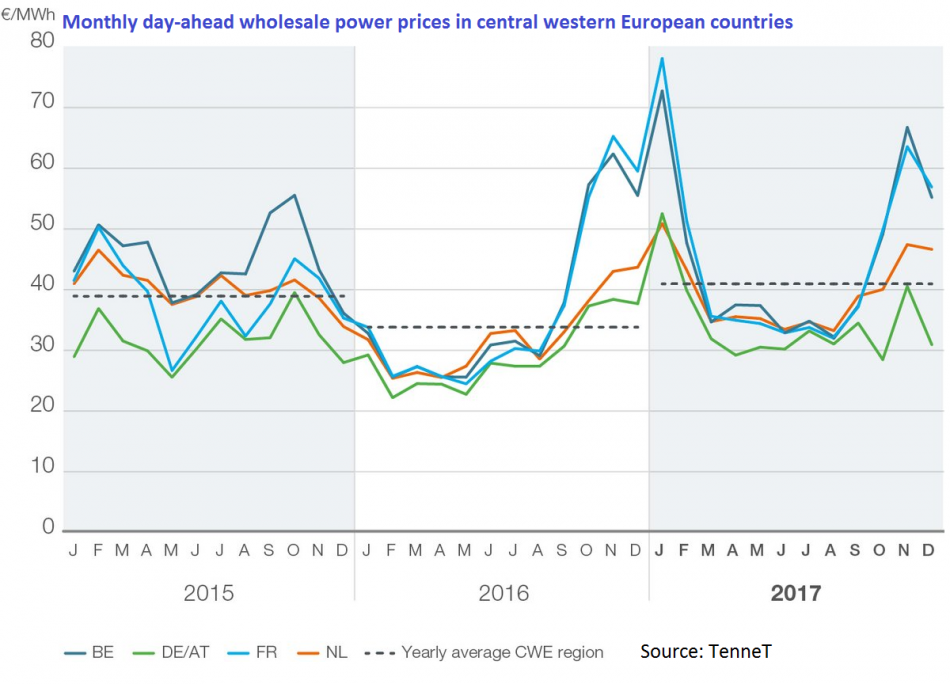German wholesale power relatively cheap / Rising solar cell efficacy
TenneT
Wholesale power prices relatively low in Germany – analysis
Wholesale power prices in Germany were comparatively low in 2017, grid operator TenneT says in a press release. Especially during the winter months, average prices in Germany and the Netherlands were much lower than in France and Belgium, TenneT reports, based on an analysis of power prices in the countries where it is active. Monthly day-ahead wholesale prices in Germany and the Netherlands peaked at just over 50 euros per megawatt-hour (MWh); in France and Belgium they exceeded 70 euro/MWh.
Find the press release in German here.
See the CLEW factsheets What business thinks of the energy transition and What German households pay for power for more information.

Fraunhofer ISE
New solar cell transforms a third of absorbed sunlight into power
German solar PV research institute Fraunhofer ISE has substantially increased solar cell efficacy with a new cell that transforms 33.3 percent of absorbed sunlight into power, the institute says in a press release. Fraunhofer ISE developed the silicon-based multi-junction solar cell together with German company EV Group.
Read the press release in English here.
Federal Motor Transport Authority
Diesel registrations in Germany down 25 percent since last year
The share of diesel cars in Germany's new vehicle registrations was down 25.4 percent in March 2018, compared to a year before, according to the Federal Motor Transport Authority (KBA). Total new car registrations stood at 347,433 vehicles, 31.4 percent of which were diesel, the KBA said in a press release. Petrol cars accounted for 64 percent of newly registered vehicles. Electric car registrations stood at 3,792 vehicles, up 73 percent on the previous year, the KBA says. Average CO2 emissions of new cars were 0.8 percent higher than in March 2017.
Find the press release in German here.
See the CLEW article Why the German diesel summit matters for climate and energy for more information.
Frankfurter Allgemeine Zeitung
German government funds diesel plaintiff DUH
Since 2010, the German government has donated around 7 million euros to NGO Environmental Action Germany (DUH), which recently gained international attention over its lawsuits against German municipal administrations which opened the door to diesel driving bans in many German cities, Kerstin Schwenn reports for the conservative newspaper Frankfurter Allgemeine Zeitung. In 2017 alone, the DUH received 1.1 million taxpayer euros, the article says. The DUH “is making policy – with massive economic consequences, for instance regarding the loss in value of diesel cars,” Schwenn writes, calling the DUH a “written warning club”.
Find the article in German here.
See the CLEW article Court ruling opens door for diesel bans in Germany and the Q&A on driving bans for background.
Rheinische Post
Germany says 20 percent of EU budget should go to climate action
The German government says the EU should devote at least 20 percent of its budget to climate-friendly projects and programmes, Rheinische Post reports. “The government supports the propositions of the EU’s Green Growth Group,” which called for one fifth of the EU budget to go to climate action by 2021, it said in response to a parliamentary inquiry by the Green Party. The German government spent a little over 1 percent of its own budget on climate action in 2017, the article says. “The German government is no credible advocate for the climate,” the Greens’ Lisa Badum told the newspaper.
Read the article in German here.
See the CLEW article New government gets little credit in quest to regain climate lead for background.

